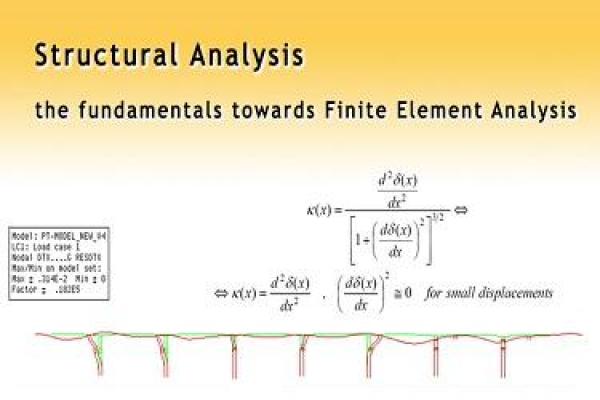Structural Analysis – the fundamentals towards Finite Element Analysis
-
The course is well organised, the professor present the concepts step by step in a straightforward and easy to understand way. The main course videos are complemented by lecture notes, tutorials and webinars that help to grasp the methods of structural analysis. The professor is very supportive with the exercises and always willing to assist the students. I highly recommand this course for anyone interested in structural analysis.
← | →
Curso
Online

¿Necesitas un coach de formación?
Te ayudará a comparar y elegir el mejor curso para ti y a financiar tu matrícula en cómodos plazos.
Descripción
-
Tipología
Curso
-
Metodología
Online
-
Horas lectivas
80h
-
Duración
10 Semanas
-
Campus online
Sí
-
Envío de materiales de aprendizaje
Sí
-
Servicio de consultas
Sí
-
Tutor personal
Sí
-
Clases virtuales
Sí
Undoubtedly, Structural Analysis is a core discipline in Engineering with a high impact on the society’s comfort, since it supports the design and construction of all infrastructures and pieces of machinery with the required serviceability and safety levels.
On the other hand, it is quite impressive how the technology evolution (mainly since the second half of the XX century) allowed to further explore the methods from Structural Analysis to a level never seen. Nowadays, it is frequent to see world records being achieved in long-span bridges, highest buildings, tunnels’ lengths either underground or sea, among other examples. This fact is due to a perfect marriage between the methods in Structural Analysis and the computational capabilities that the computers nowadays can offer.
In such a context, and taking the most benefit from this perfect marriage, structural problems can become a highly complex task, which they can only be fully tackled with the support of so-called Finite Element software packages. Consequently, the higher is the problem complexity (i.e. the criticality/impact of the structure under analysis in the society, as some examples given above), the higher is the role of fundamental knowledge, know-how, and self-judgment from the expert to understand the obtained results from those software packages. The ability to understand the physics/mechanics behind it, supported by the methods from Structural Analysis is the bottom-line for a successful career as a leading expert in this challenging and exciting field of Engineering.
A tener en cuenta
In this context, the course objectives can be organized as follows (bottom-up):
- To review concepts related to theoretical concepts
To introduce the typical structural schemes in engineering
- To learn and explore fundamental and enhanced methods of analysis
- To perform hand calculations on several practical examples
- To compare the hand calculations with the respective numerical simulations
- To understand the value from the comparison of hand calculations vs. numerical simulations
The course Structural Analysis – the fundamentals towards Finite Element Analysis is a comprehensive course and structured on a bottom-up approach, meaning that no special knowledge is required in the subject. Hence, this course might be of interest to (but not limited, of course):
– Graduated engineers with interest in getting into the subject to towards a postgraduate course in structural engineering,
– Postgraduate engineers with interest to review concepts and improve skills related to structural analysis methods,
Researchers aiming for deep learning on advanced structural analysis towards Finite Element Analysis packages.
Opiniones
-
The course is well organised, the professor present the concepts step by step in a straightforward and easy to understand way. The main course videos are complemented by lecture notes, tutorials and webinars that help to grasp the methods of structural analysis. The professor is very supportive with the exercises and always willing to assist the students. I highly recommand this course for anyone interested in structural analysis.
← | →
Valoración del curso
Lo recomiendan
Valoración del Centro
Walid Hendaoui
Logros de este Centro
Todos los cursos están actualizados
La valoración media es superior a 3,7
Más de 50 opiniones en los últimos 12 meses
Este centro lleva 10 años en Emagister.
Materias
- Structural analysis1
1 alumnos han indicado haber adquirido esta competencia
- Engineering
- Finite Element Analysis
- Technology
- Finite Element Method
- Computational-based methods
- Equilibrium of structures
- Tunnels
- Bridges
- Buildings
Profesores

Helder Sousa
Visiting Professor at the University of Surrey, UK
Dr Helder Sousa is an expert, with 17 years of international experience and strong exposure to the industry sector, on Structural Health Monitoring (SHM) applied on Civil Engineering infrastructures and Visiting Professor at the University of Surrey, UK.
Temario
- – Module 1 – Introduction and typical structural schemes
- Loads on structures,
- Equilibrium of structures,
- Trusses,
- Beams and frames,
- Cables.
- – Module 2 – Fundamental methods
- Influence lines,
- Double integration method,
- Moment-area method,
- Conjugate beam method,
- Work-Energy methods.
- – Module 3 – Enhanced methods
- Flexibility method,
- Stiffness method,
- Moment-distribution method.
- – Module 4 – Computational-based methods
- Finite Element Method.
The learning method used along the course is based on online resources, available by the virtual Campus, with a clear and straightforward approach. For this, the planned 4 modules (described above), will be based on comprehensive documentation covering theory, practical applications as well as practical exercises to be solved by the students. Hence, the course will be materialized by:
- – Lecture notes and complementary documentation with the theory
- – Recorded lectures explaining the content on the lecture notes
- – Exercises to apply and consolidate the theory
- – Live classes, through videoconferences (webinars), for clarification on the exercises
- Tutorial support along all course period by email, chat and live webinars to enhance students’ progress.
¿Necesitas un coach de formación?
Te ayudará a comparar y elegir el mejor curso para ti y a financiar tu matrícula en cómodos plazos.
Structural Analysis – the fundamentals towards Finite Element Analysis
Añade cursos similares
y compara para elegir mejor
Formación por temáticas
{body}

